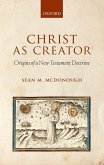Cary's controversial thesis is indicated in the subtitle: that Augustines thought has no room for a concept of efficacious external means of grace, i.e., that neither word nor sacrament (both of which are outward signs) can convey to us the divine inner gift of grace. Therefore nothing external, neither Gospel nor Baptism nor Eucharist nor the very flesh of Christ, has the power to save us; we are saved by a power that comes to us from within, directly from God and not through external means. This thesis puts Augustine at odds with later Catholic sacramental theology (which is why many Catholic readers wont like it) but also with Lutheran and other high church Protestant theologies.
Hinweis: Dieser Artikel kann nur an eine deutsche Lieferadresse ausgeliefert werden.
Hinweis: Dieser Artikel kann nur an eine deutsche Lieferadresse ausgeliefert werden.









